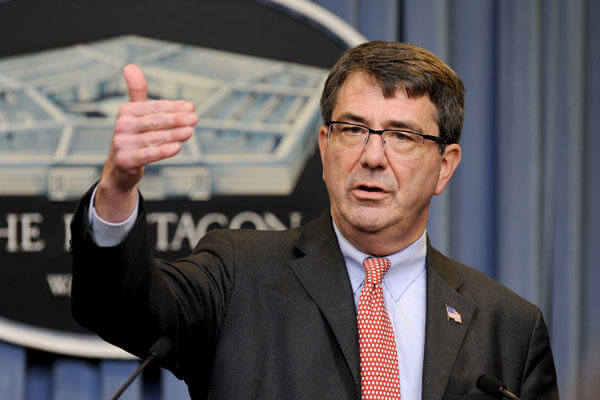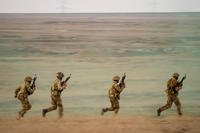New Defense Secretary Ashton Carter will officially take office Tuesday facing a growing list of global crises to include ISIS and Russia, but his most pressing challenge will be the political gridlock at home, former Defense Secretary Leon Panetta said Sunday.
"The total dysfunction in Washington" is "the greatest threat to national security," Panetta said on CNN's "State of the Union" program.
Panetta and former Defense Secretary Robert Gates have complained in books that they not only had to deal with the inability of Congress and the White House to get on the same page on defense issues, but also to contend with the tendency of the White House staff to "micromanage" the military.
Panetta expressed confidence that Carter could avoid the micromanagement. "I think the president would not have nominated him to be Secretary of Defense if he wasn't going to listen," Panetta said. But Carter will still have to depend on Congress and the White House reaching consensus on a range of issues.
The 60-year-old Carter was expected to take the oath Tuesday at the White House as the nation's 25th defense secretary and Obama's fourth in six years.
He will then go to the Pentagon to outline his vision for the military in what will likely be less than two years as manager of the Defense Department, as Obama makes way for a new president in early 2017.
However, Obama broke precedent in his first term by having Gates, who served as defense secretary under former President George W. Bush, stay on at the Pentagon.
Outgoing Defense Secretary Chuck Hagel left the Pentagon for the last time on Friday after roaming the building to say goodbye, to include an off-the-record session with Pentagon reporters. Hagel has said previously that he had no immediate plans for the future but will maintain an office near the Pentagon for a while to clear up paperwork.
Hagel was the only combat enlisted veteran to serve as defense secretary. He went to college on the GI Bill and served two terms as a Republican senator from Nebraska.
Carter is a Yale graduate who holds a doctorate in physics from Oxford University. He has never served in the military and has never held elective office.
However, Carter has long experience as a manager at the Pentagon. He served in the Defense Department under former President Bill Clinton’s administration and later served as the deputy defense secretary under the Obama administration before stepping down last year.
A significant contrast between Hagel and Carter was their treatment in the Senate confirmation process.
Hagel went through a combative confirmation hearing before the Senate Armed Services Committee (SASC) at which his support for Israel and the lead role of the U.S. in the world were questioned.
His confirmation vote in the full Senate was filibustered and he finally won approval by a vote of 58-41. Many analysts now say that Hagel's tenure as defense secretary was handcuffed at the start by the confirmation process.
Carter's confirmation process was swift and relatively smooth, as critics avoided personal attacks to aim their policy barbs at the White House.
Carter was approved by a vote of 93-5. The only senators voting against were Sens. John Boozman, R-Ark.; Roy Blunt, R-Mo.; Mike Crapo, R-Idaho; Mark Kirk. R-Ill.; and James Risch, R-Idaho.
Before the final vote, Senate Majority Leader Mitch McConnell, R-Ky., and Sen. John McCain, the SASC chairman, pointed to the same difficulties later mentioned by Panetta that Carter will have in steering an independent course with Congress and the White House.
McConnell said that Carter "needs to have the courage to speak truth to power -- to Congress, yes, but also to his commander in chief."
McCain said he had "sincere hope and, sadly, little confidence that the president who nominated Dr. Carter will empower him to lead and contribute to the fullest extent of his abilities."
Leading the list of challenges for Carter was Obama's proposal for Congress to approve new authority for the use of force against the extremists of the Islamic State of Iraq and Syria (ISIS).
In his confirmation hearing, Carter has suggested that he might recommend more flexibility for U.S. commanders in troop numbers and how they are used against ISIS, as well as in Afghanistan.
Carter also said he was "inclined" to support sending weapons to Ukraine in the fight against Russian-backed separatists, while also backing the continued rebalance of forces to the Asia-Pacific region.
Carter has backed the Obama administration's 2015 budget request for $534 billion in the base budget and another $51 billion for the separate budget for Overseas Contingency Operations (OCO). The OCO budget includes about $5 billion for Iraq and Syria operations and about $42.5 billion for Afghanistan.
The base budget is about $36 billion over the spending limits imposed under the sequestration process of the Budget Control Act of 2011. House and Senate leaders agree that sequestration must be lifted for defense, but there has been little sign of agreement thus far on how that would be done.
Carter will also have to deal with the recent recommendations of the Congressionally-mandated Military Compensation and Retirement Modernization Commission to include a major overhaul of the current military retirement system.
All of the issues facing Carter require urgency. The full House, one-third of the Senate, and the presidency are up for election next year, making compromise that much more difficult.
-- Richard Sisk can be reached at Richard.sisk@military.com.






























